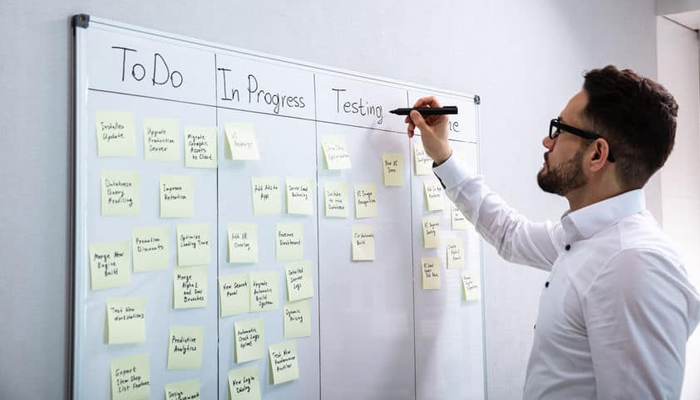
Time always seems to be the one resource that we never have in quantity, especially when it comes to our work. There are meetings to attend, emails to answer, projects to complete, and random problems that pop up at the most inconvenient time. If you have ever found yourself driving home from work with no idea where your time went, you are certainly not alone. The great thing is that effective time management skills can make your workdays feel more organized, productive, and less stressful.
1. Start Your Day with a Clear Plan

One of the simplest things to do to boost productivity in the office is to begin with a solid plan. Spare a few minutes before you begin work to sketch out your priorities. A daily to-do list or computer calendar can help you with viewing exactly what has to be done first.
By starting with a plan, you win the game of answering every request or message that comes into your inbox. Instead, you’re in control of your calendar, and you’re prioritizing the most essential.
2. Categorise Tasks using the Eisenhower Matrix
Not all tasks are equal. Some need to be addressed right now, while others can wait. The Eisenhower Matrix is a retro method of categorizing your work into four categories:
Urgent and important
Important but not urgent
Urgent but not important
Neither urgent nor important
By prioritizing your work in this way, you immediately know what needs your attention and what can be delegated, scheduled, or even eliminated. This makes you organized and ensures that your energy expenditure is on the right activities.
3. Break Large Projects into Manageable Steps

Major projects are intimidating when you consider only the outcome. It is helpful with time management to break them up into little steps, which can be handled. Each step must be understandable and doable, so you are certain of what to do next.
For example, instead of putting “Finish report” on your list, break it down into “Gather data,” “Write draft,” and “Edit final version.” Completing each of these tasks makes you feel as though you are getting somewhere and reduces the feeling of overload of the whole project.
4. Limit Multitasking and One Task at a Time
Even though it looks efficient, research shows that multitasking reduces productivity and also causes more errors. The brain operates optimally if we concentrate on one thing only at a time.
If you find yourself switching between emails, spreadsheets, and chat apps every couple of minutes, try to block time for activities. For instance, use 30 minutes for emails, then switch into focused project work. This reduces distractions and allows you to complete tasks more effectively.
5. Use Time Blocking to Structure Your Day
Time blocking is a useful strategy to be structured and boost productivity at work. Instead of keeping your day available, block time slots for different activities or categories of work.
For example:
9:00–10:00 AM: Reply to emails and set daily schedule
10:00–12:00 PM: Deep work (writing, coding, or analysis)
1:00–2:00 PM: Collaboration or meetings
3:00–4:00 PM: Project updates and documentation
This method ensures your day has structure and reduces the chance of getting pulled into time-wasting activities.
6. Minimise Workplace Distractions

Distractions are one of the biggest threats to effective time management. Phone notifications, social media, and even chatty co-workers can eat away at your focus.
Think about setting boundaries, such as silencing your phone while doing deep work or using noise-cancelling headphones. Others find it helpful to set “office hours” when others can contact them for a chat, so that they have time to get into a work flow.
By taking control of your environment, you make space for productive, distraction-free work.
7. Learn to Say No (Politely)
The skill of saying no is an underemphasized time management skill. Being helpful is equated with accepting every request, but overcommitting and stress will probably follow.
Rather, think about whether the task fits your priorities; if it does not, simply say no or suggest an updated timeline that you are able to accommodate. “No” does not make you inconsiderate, it shows that you value your time and would like to deliver quality work on the commitments you already have.
8. Use Technology Smartly to Stay Organized
Computer programs can greatly impact how you organize your time. Calendar programs, task managers, and project management software can aid you in keeping track of deadlines, collaborating with co-workers and managing your workload.
But technology exists to support your productivity, not entomb it. Don’t clutter yourself with too many programs, and just maintain those that actually add value to your workflow. Trello, Asana, or even a plain Jane Google Calendar might be enough to keep you on schedule.
9. Take Regular Breaks to Recharge

It may sound paradoxical, but working constantly isn’t the most effective way to remain productive. Our minds require intermittent breaks to refresh themselves, particularly when engaging in highly intellectual activities.
Give the Pomodoro Technique a try, where you work in 25-minute increments and break for 5 minutes. When you have completed four rounds, take a longer break. This cycle sustains concentration and avoids burnout, making your workday more productive in the long run.
10. Review Your Day and Make Adjustments for Tomorrow
Every night, take a few minutes to reflect on your day. Ask yourself: What did I do efficiently? What did I do slowly? What can I do differently tomorrow?
This daily review helps you adjust your approach and create more positive time management habits in the long term. With continued refinement of your method, you’ll accomplish more without losing your cool.
Conclusion
Streamlining your workday doesn’t require that you do a complete overhaul but it’s a matter of making small, realistic changes that smooth out your day and make it more productive. From starting the day with a good plan to taking time away and learning when to say no, each of these strategies can help you keep ahead of your job and stay in control.

By applying these time management tips consistently, you’ll notice an increase in workplace productivity and a greater sense of balance in your daily routine. Remember, time is one of your most valuable resources therefore managing it well means you’ll have more energy for the work that truly matters.
